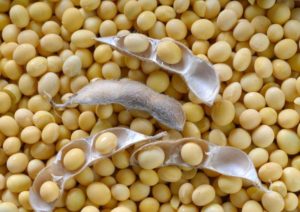Lecithin, also known as soy lecithin, is a natural emulsifier and stabilizer. It comes from fatty substances found in plant and animal tissues.
Contents
Uses
- Soy Lecithin, or lecithin, is commonly used to hold emulsions together.
- Lecithin is a very common ingredient in packaged foods because it is such a great emulsifier and stabilizer.
- It’s also the main reason egg yolks work so well to stabilize mayonnaise, aiolis, and sauces like Hollandaise.
- In modernist cooking it is often used to hold vinaigrettes together, create light foams and airs, and add elasticity and moisture tolerance to doughs
Benefits
- Protects cells: Lecithin is a necessary component of every cell in the human body. Considered a keystone in the construction of cells, lecithin prevents the hardening of cell membranes. Healthy cells lead to a healthier body, and the membranes are a critical part in monitoring a cell’s intake and output. Protecting cells is integral in maintaining a body’s resistance to many diseases that attack damaged cells. Phospholipids such as lecithin are produced in certain amounts throughout the major organs of the body (such as the heart, liver and kidney) but can be supplemented to further enhance unrealized benefits.
- Helps repair liver and protects arteries: In addition to the cardiovascular benefits of lecithin, there are indications that lecithin helps to restore livers that have been damaged as well as working with neurological functions such as memory to improve the brain’s effectiveness. Since lecithin is essentially composed of fat, it can act as a protective wall or sheath throughout the body to protect and strengthen membranes and prevent detrimental debris from sticking. Internal parts and mechanisms that may be affected negatively by hardening, such as arteries, are kept malleable by lecithin in a natural way through supplementation. Patients suffering from atherosclerosis often start a regimen of lecithin in an effort to reverse the condition’s effects.
- Aids memory: Lecithin has shown, in addition to the heart, circulatory and metabolic benefits, a tendency to aid the brain in memory and learning. Studies conducted on the effects of lecithin on the brain lean towards a conclusion that users of the supplement are likely to experience increased memory and ability to recall specific information. The benefits of lecithin on the brain are promising to patients who may be suffering from Alzheimer’s disease or other memory-specific neurological conditions. Improved memory and recall is a sign of a brain’s overall standard of health, and may imply benefits that extend to orientation and cognitive thought processes.
Cautions
- Common side effects may include:
- diarrhea, nausea, abdominal pain or fullness.
- This is not a complete list of side effects and others may occur. Call your doctor for medical advice about side effects.
- It is possible that some side effects of Soya Lecithin may not have been reported. These can be reported to the FDA here. Always consult a healthcare professional for medical advice.
Interactions
Please consult with your doctor!
Other names
Lecithin
References
Herbwisdom, http://www.herbwisdom.com/herb-lecithin.html
AmazingFoodmadeeasy, http://www.amazingfoodmadeeasy.com/info/modernist-ingredients/more/soy-lecithin
Drugs.com, http://www.drugs.com/sfx/soya-lecithin-side-effects.html

